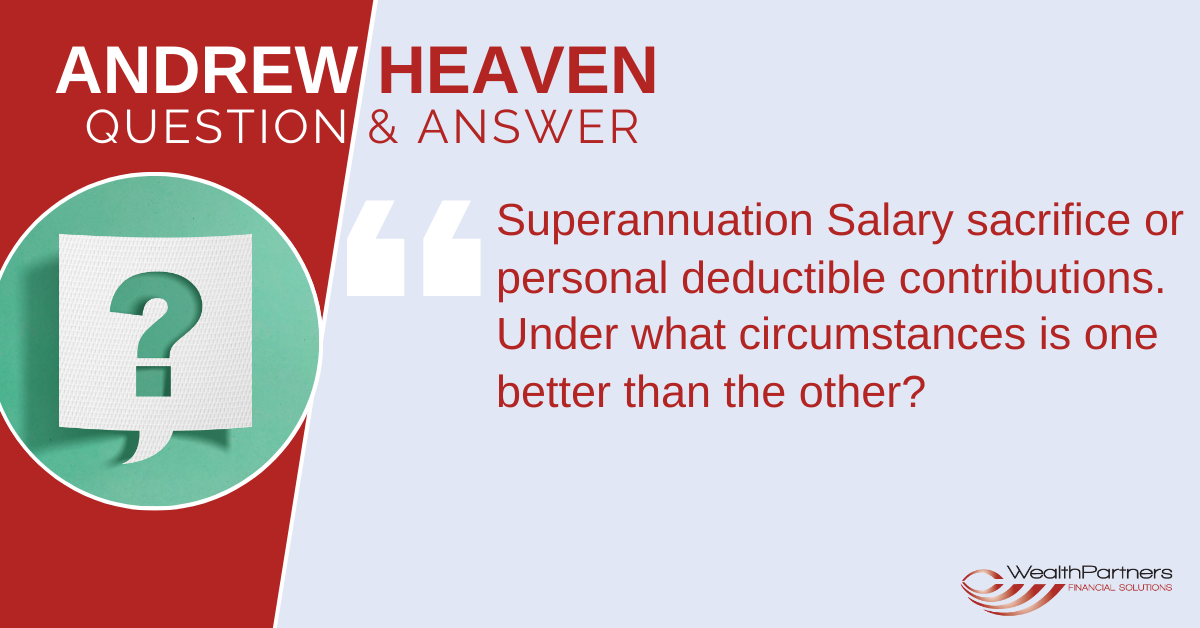Q: I am employed full time and my employer allows me to make Salary Sacrifice contributions to Superannuation. Rather than make Salary Sacrifice contributions, should I make personal Superannuation contributions and then claim the tax deduction on my personal contributions?
A: Individuals who are eligible to contribute to Superannuation are able to claim a tax deduction for their personal Superannuation contributions.
Broadly speaking, to be eligible to make a personal Superannuation contribution, you need to be under age 75 at the time of making the contribution and have a Tax file number. If you are age 65 or older you are obliged to satisfy the work test of 40 hours work, in a 30 day period in the financial year that you make the contribution before you can make your contribution.
Personal superannuation contributions made, where you claim a tax deduction, count towards the Concessional Contribution Cap of $25,000 per financial year.
It is important to recognise that the Concessional Contribution Cap includes all Employer and Personal Deductible Contributions in aggregate per Financial Year.
You need to be aware and monitor the Employer Superannuation support you have received. You need to be careful when the contributions are received by the fund and within which Financial Year. Be careful, a liability for an Employer Contribution may arise in one financial year but may be paid by the employer in the next financial year.
Contributions that exceed the Concessional Contribution Cap are taxed at your marginal tax rate, will attract an excess Concessional Contribution charge, and will count towards your Non-Concessional Contribution cap if they are not subsequently withdrawn from the superannuation system.
In order to claim a tax deduction for personal contributions to Super, you will need to give written notice to your Superannuation fund. This is typically done by submitting a Notice of Intent that you wish to claim a tax deduction for all or part of the contribution you have made to the fund within the specified time frames. At the very latest, this notice must be submitted prior to you lodging your tax return but may need to be lodged sooner than this.
There are advantages of making deductible personal Superannuation contributions rather than Salary Sacrifice contributions; You can control the timing of your contributions to your Superannuation fund and have greater control in the timing of the placement of investments. For example, if markets were to fall, you can elect to either invest immediately or wait until you are comfortable to invest. You have greater ability to manage the risks of exceeding the contribution caps due to the timing of employer’s making contributions which are not within your control. You can target reaching your cap precisely as you will be controlling the timing of the additional personal contribution.
Deductible Personal Superannuation contributions also benefit those who have a mix of employment and self-employment. Previously these individuals were unable to claim a personal tax deduction if their employment income was greater than 10% of their taxable income.
The primary advantage of salary sacrificing Superannuation contributions is the forced savings element; the money comes out of wages, and is paid to your Superannuation, before you are paid. The primary advantage of personal deductible Superannuation contributions is you can control the timing of contributions and better target reaching your Concessional contribution caps. Ultimately both contribution types contribute to your Superannuation with the same tax consequences. You choose the manner which suits you better.


